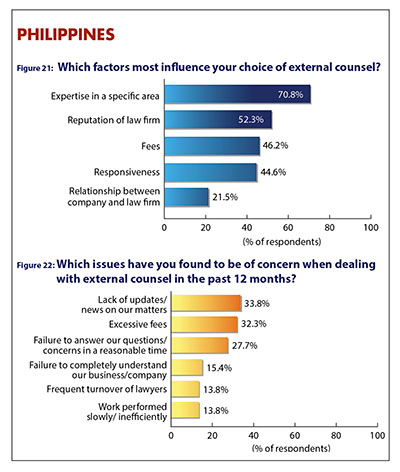 The most responsive sector of this jurisdiction’s In-House Community in this year’s survey is Government/Regulatory, with 29.2 percent represented by this classification. Joint second are Energy/Natural Resources and Financial Services, each with 12.3 percent. Real Estate/Construction in-house counsel, at 9.2 percent, are also well-represented. 7.7 percent of respondents are working in Manufacturing companies and 4.6 percent in the area of Fast-Moving Consumer Goods. Team sizes The majority believe that their teams will remain the same size over the coming year, with 61.9 percent stating so. Asked why, members of the community in some cases noted that resources were scarce and therefore budgetary constraints would make adding to their teams implausible, while others concluded that their current staff could take on the current workload. The 36.5 percent expecting growth mentioned factors such as growing business, some due to ASEAN integration. Recruitment KEY ISSUES AND CONCERNS As with their peers around the region, keeping up with new regulations and developments is always a challenge: “The Fair Competition Act is a hot topic right now, and the implementing rules will be scrutinised … Also, data privacy is extremely important despite the absence of the implementing rules, given the heavy overseas regulation”. Looking to the future, members of the In-House Community in the Philippines expect compliance, FATCA, competition law and developments across ASEAN to keep them busy. Many observers feel that the Philippines is better placed than many jurisdictions to take advantage of the upcoming ASEAN integration, not least its lawyers, who having native language standards of English, which will be the official language of the ASEAN Economic Community, are well suited for cross-border roles. Working with external counsel Of the 35.6 percent expecting to use external counsel more over the next year, many pointed to business expansion and added complexity of legal issues, as well as a changing regulatory environment. On what makes certain external counsel stand out, 70.8 percent of participants said expertise in a specific area. 52.3 percent are swayed by the reputation of the law firm, 46.2 percent by fees and the fourth most prevailent reason was responsiveness, with 44.6 percent of the votes. (Figure 21) Over the past 12 months, a lack of updates on matters has been the main problem when dealing with external counsel in the Philippines according to the 33.8 percent of the community that gave this answer. Excessive fees, which have been found to be a problem by 32.3 percent, and a failure to answer questions in a timely fashion, noted by 27.7 percent, were also recurring issues. (Figure 22) |
| Jump to FIRM OF THE YEAR result | Back to survey home page |




















